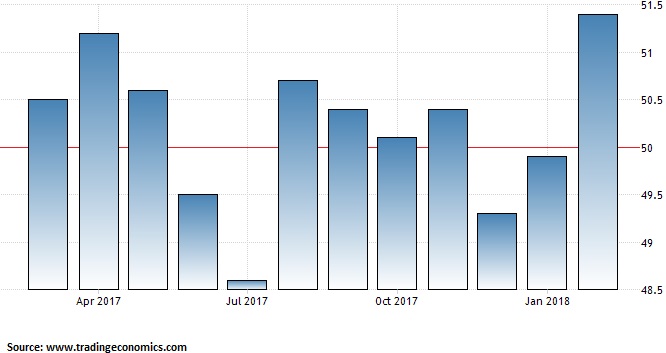Growth of Manufacturing Activity in Indonesia Jumps in February 2018
Indonesia's manufacturing activity improved markedly in February 2018 with the Nikkei Indonesia Manufacturing Purchasing Managers' Index (PMI) rising to a reading of 51.4, from 49.9 in January (the 50.0 level separates contraction from expansion). It was the fastest pace of growth for Indonesia's manufacturing sector since June 2016; growth that came on the back of rising output and new orders.
Improving business conditions in Southeast Asia's largest economy made manufacturing companies decide to add staff-members, hence payrolls rose for the first time in nearly a year-and-a-half. Meanwhile, these companies also raised their purchasing activity, albeit modestly. However, cost pressures intensified amid rupiah weakness.
Last month, Indonesian manufacturing companies modestly raised production levels for the first time in three months. Rising production came on the back of growing new orders. After two months of declines, total new orders finally rose again in February, albeit marginally. Rising new orders primarily stemmed from increasing domestic demand as new export orders continued to fall in February (although at the weakest rate in the current three-month sequence).
For the first time in 17 months Indonesian manufacturing companies raised their payroll numbers with the rate of growth being the second-strongest that was recorded in the history of the Nikkei Indonesia Manufacturing PMI survey.
Manufacturers boosted their purchasing activity slightly in February. However, they had to face rising purchasing costs as the Indonesian rupiah showed weakness that month. Meanwhile, the rate of cost inflation picked-up from January's three-month low and was sharp overall. As a response, manufacturers increased output charges at the fastest pace since November 2017 (hence passing on part of the higher cost burden to customers).

The survey also showed that manufacturing companies remained confident that output will rise over the coming year (on expectations of improvement in demand and planned expansion), although sentiment was weaker than the series trend.
Aashna Dodhia, economist at IHS Markit, stated that the health of the Indonesian manufacturing sector improved for the first time in three months in February, and to the greatest extent since June 2016. The recovery in domestic markets outweighed the slight decline in overseas demand for Indonesian goods, with total new orders and output both rising for the first time since last November.
Encouragingly, Indonesia's improved performance stimulated jobs growth for the first time in nearly one-and-a-half years. Furthermore, the rate of job creation was the second-strongest recorded in the series history.
Firms faced sharp inflationary pressures that emanated from a weak rupiah relative to the US dollar. Nevertheless, the pace of cost inflation remained slightly below the series trend, affirming Bank Indonesia's stance to keep policy rates unchanged.
However, a key concern remains the ability of manufacturing companies to pass on higher input costs, as output charge inflation was only modest.
Manufacturing PMI Indonesia:

